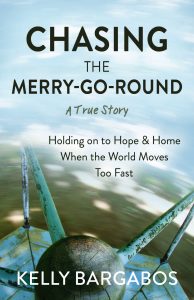 Chasing the Merry-Go-Round: Holding on to Hope & Home When the World Moves Too Fast
Chasing the Merry-Go-Round: Holding on to Hope & Home When the World Moves Too Fast
Author’s Note By Kelly Bargabos
My heart has always been to tell the story of my brother, Bobby, so that people could see what life is truly like for someone like him. In a culture that has historically valued strength over weakness, intellect over character, and accomplishment over a simpler life, a segment of our population is systemically and repeatedly marginalized—unseen and unheard. When someone has physical disabilities that are invisible and intellectual limitations that aren’t always obvious, life is challenging in ways that most of us don’t understand.
I began our story in 1976 when Bobby first entered my life. I told his story mostly chronologically, but life is not always a neat, narrative arc that moves in a linear, chronological, and progressive path. Often and almost always, it is a series or set of messy circles that intersect and change and move and sometimes sit still for many years until one day something happens or someone says something at just the right time, in just the right way, and you suddenly see something clearly for the very first time in your life. You realize that something that happened to the six-year-old version of you is directly connected to your forty-year-old self, completing a circle that was in you all along and you had no idea. And so it was with me. I could not tell Bobby’s story without telling at least some of mine.
Bobby changed my life. From a young age, I thought it was my job to fix everyone and everything around me because if the people I loved were unhappy it was my fault, it was because I wasn’t good enough. And if I could fix them, I could fix me. I could be enough. I was caught up in making sure everybody was okay, and part of that was making sure Bobby was normal with a normal life.
As someone who has spent most of his life feeling unheard and misunderstood, Bobby was excited to share his story. An invisible disability, whether physical or intellectual, is one that is not obvious at first glance. There is no outward sign that fits our culture’s preconceived ideas of what determines a disability. An invisible disability causes limitations and challenges that can make ordinary life more difficult and because of the invisible nature, people with invisible disabilities are most often judged, misunderstood and marginalized. My hope is that readers will see that this culture’s normal isn’t for everyone, there is treasure in those around us if we take the time to see it, and that even though you may not always get the life you dream of, it is still a life and happiness can be found in the simple pleasures of family, food, work and music.
I discovered through the writing, that this story, the story of Bobby and me, was always about home. Bobby was suddenly removed from his home of origin at ten months old and has spent the rest of his life searching for and wanting desperately to have his own home, getting close at times but never quite attaining it. For Bobby, home is tangible: a place constructed of a dining room, a garage, and a yard. I’ve learned from Bobby, and my work with my therapist, that I have also been on a quest for home. But for me, home is abstract: an ideal constructed of the people I love. My quest has been to keep those people intact, safe, cared for and stable. Only then could my home be at peace. I know now that my home cannot be built on the premise that everyone I love remains in a perfect state: happy, safe, successful and peaceful. We have each other’s imperfections, sicknesses, labels and messes. We own each other’s mistakes, regrets, failures and bad decisions. We celebrate it all: our faith in God, good health, meals together and laughter. I know now that home is a place all of us want to be. We all want to have our corner of the world, surrounded by people who know us, accept us, love us; a place where we are safe, warm, fed; a place where we have enough, where we are enough.
There are many people like my brother in this world—people who need a little extra help to keep up with this fast-paced system we’ve created. How we care for those who need help has an everlasting impact. If the basic needs of a person’s spirit, soul and body are met, it allows them the ability to keep their own corner of the world—their home—safe and prosperous for them and their family. This is all there is.
Read Laura Dennis’ review of Chasing the Merry-Go-Round.
Kelly Bargabos is the award-winning author of Chasing the Merry-Go-Round: Holding on to Hope & Home When the World Moves Too Fast, a 2018 Nautilus Book Award Silver winner and a finalist in the National Indie Excellence Awards. Kelly writes as a witness to the spectrum of human experience in order to connect, share, shift paradigms, inspire and ultimately expand our universe through words. Although she has spent most of her life surviving the winter in upstate New York, Kelly now lives in San Diego, CA where she continues to write about the things that move her, with the hope they move you.
